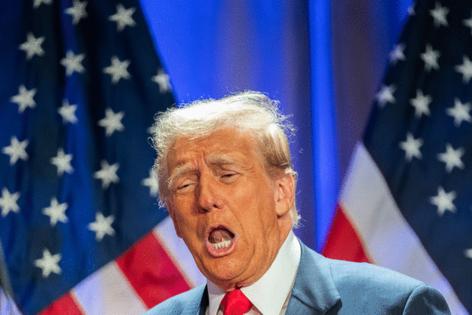Commentary: Free speech in the Trump age
Published in Political News
There is an understandable urge among many Americans to cast aside America's essential principles in a frenetic effort to oppose Donald Trump. And there's a logic to this approach: He does it, so why shouldn't we?
Yet doing so would be a big mistake.
For starters, it often backfires. Take the essential principle of respecting the rule of law. Overreaching anti-Trump impeachment efforts, special counsel investigations and criminal cases all boomeranged into Republican rallying cries and helped Trump retake the presidency.
It’s not always true in politics that the harder you fight the more successful you will be. Exercising judgment matters, too.
A far better approach is to double down on the essential principles of American democracy. They work. In fact, America's founders specifically engineered them to be effective tools against the threat of politicians with autocratic impulses.
Among these essential principles: the right to free speech. History reveals that free speech is vital to human freedom. Tyrants don’t just concentrate power; they eliminate dissent and monopolize ideas. Violence within and between nations increases when governments stifle communication. And restricting the marketplace of ideas decreases innovations that promote human flourishing.
All too often in the Trump era, however, Americans have sought to suppress speech they didn't like. Hostility to divergent views has infected many American institutions, from corporations and nonprofits to the media and government agencies. The tactics can get extreme: attacking speakers on social media; running people from their jobs; denying tenure to professors; shouting down speakers with the wrong views; threatening administrators with the wrong rules; boycotting companies affiliated with the wrong people.
More and more Americans are casting aside age-old principles valuing free speech in favor of short-sighted, knee-jerk prohibitions on speakers they don’t like.
This is wrong. The way to counteract speech you don’t like is to explain why it’s wrong. Silencing speech and canceling speakers is deeply counterproductive for three reasons.
First, the censors don’t have more wisdom than the censored. They often have less. Censorship can just as easily muzzle important truths as it can silence subversive lies. History is filled with minority views that eventually became gospel (every person should be equal under the law) and popular ideas that eventually became abominations (certain races are inferior to others).
Second, accuracy matters. Silencing speech is often motivated by the desire to preserve cherished narratives that are empirically incorrect. Bad ideas love nothing more than a marketplace hostile to new ones. This is especially dangerous in a representative democracy like America, where the views of constituents inform and even dictate the official acts of their elected representatives.
Speaking accurately should be encouraged, even if it upsets people. This doesn’t mean speakers should over-emphasize hard truths and controversial ideas. Nor should speakers exaggerate them, fail to show decency when expressing them or assert them at the wrong time, in the wrong place or in the wrong manner. But if speakers navigate all that and merely state objective facts, pose empirically valid questions or offer reasoned conclusions then they should come under no scorn. There needs to be space in the public square for people to speak accurately. Even if it sometimes hurts to hear.
Finally, silencing speech is a slippery slope. What starts at the university can eventually go mainstream. And what goes mainstream can eventually infect the highest echelons of government. Once this happens, a straight line to tyranny emerges. President Harry Truman put it plainly in 1950: “Once a government is committed to the principle of silencing the voice of opposition, it has only one way to go, and that is down the path of increasingly repressive measures, until it becomes a source of terror to all its citizens and creates a country where everyone lives in fear.”
Free speech is indeed essential to a functioning society. We must fight to preserve it by respecting and promoting it ourselves. Even when the speaker says things we don't want to hear. And even, indeed especially, when Donald Trump is president.
____
Cooper is the author of “How America Works … and Why it Doesn’t.”
_____
©2024 The Fulcrum. Visit at thefulcrum.us. Distributed by Tribune Content Agency, LLC.




























































Comments